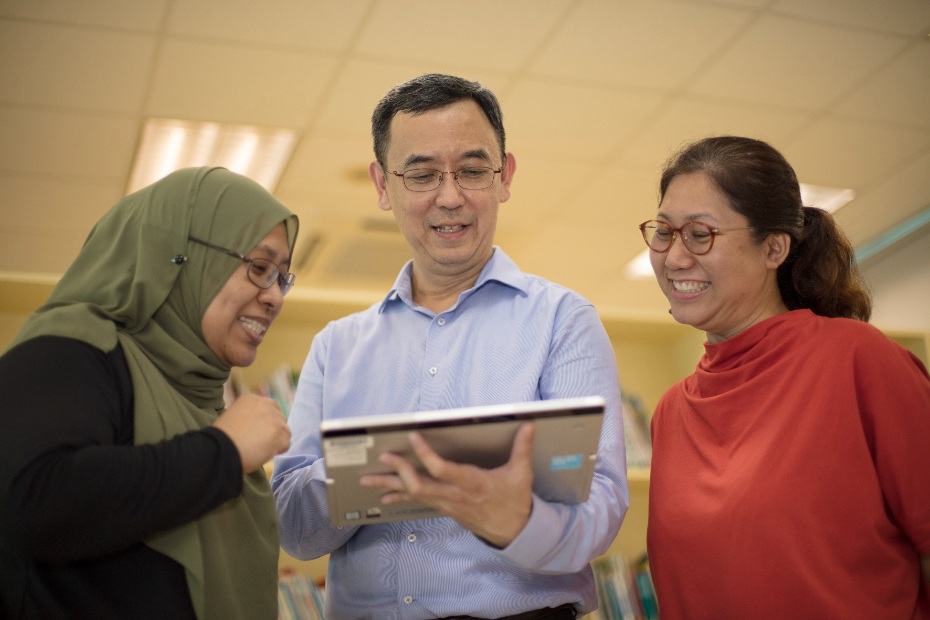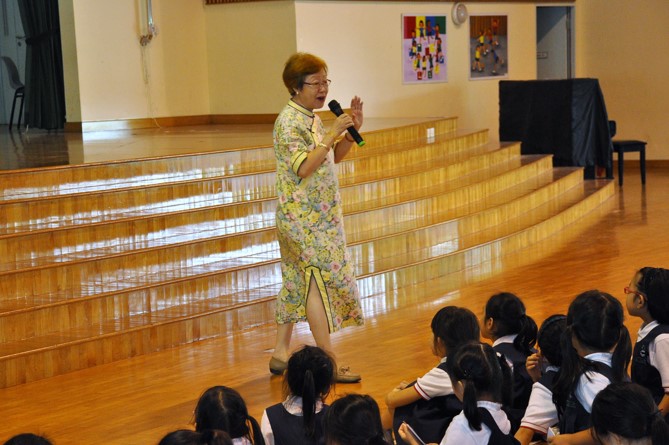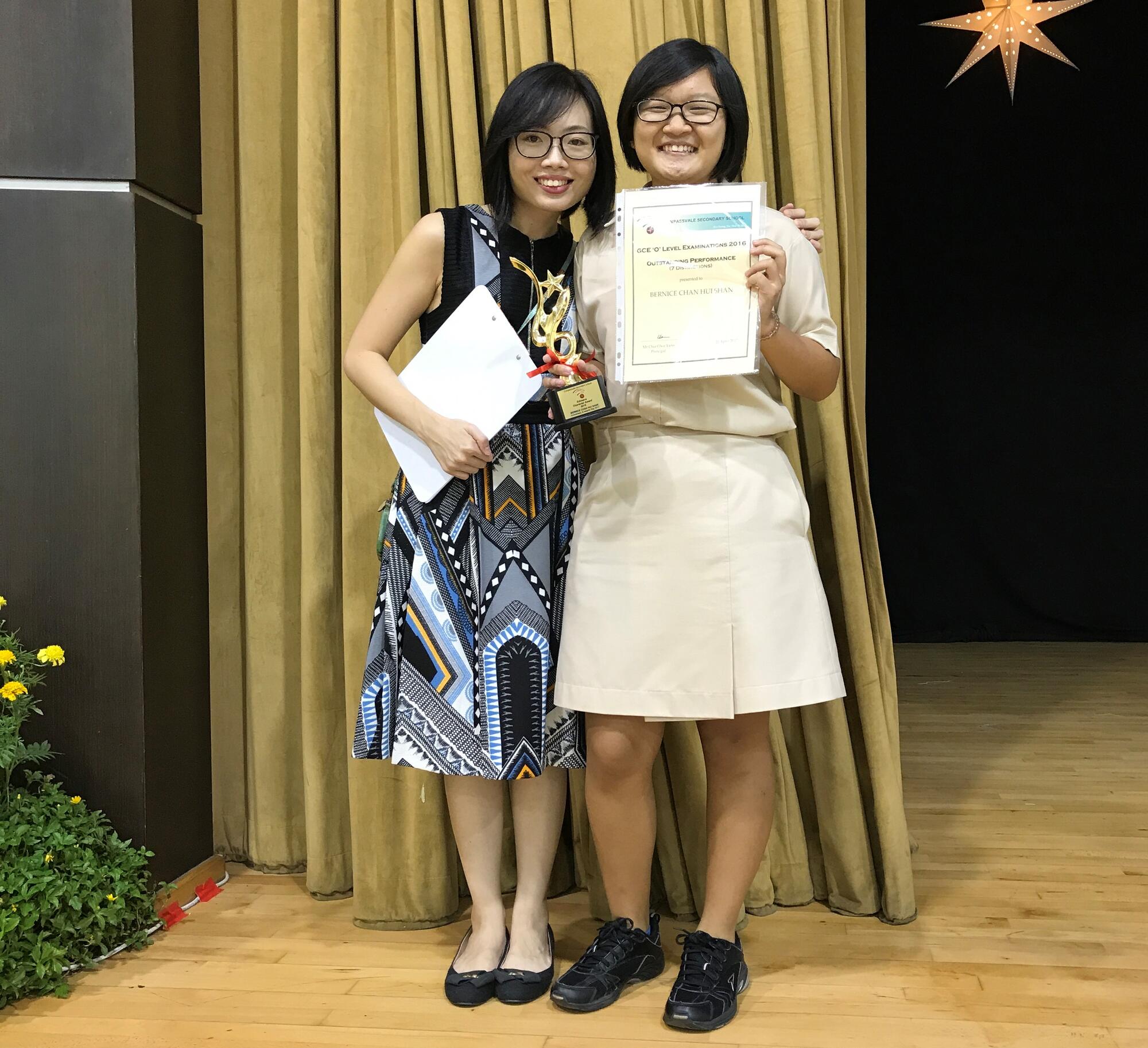Mr Zhang Pengchi , Temasek Polytechnic, President’s Award for Teachers 2020 Finalist
The phrase “allosteric regulation of enzymes” would probably intimidate most students the first time they hear it. But what if they had a lecturer explain it using kung fu? (Yes, you read that right.)
Enter Temasek Polytechnic’s (TP) Zhang Pengchi, Course Chair at the School of Applied Science.
“I get two students to join me in front of the class to demonstrate the analogy. I will ‘be’ an enzyme and my hands are the active sites holding substrates to speed up the reaction,” explained Pengchi.
“So, when an allosteric inhibitor attacks me, it is like having a martial arts expert hold on my shoulder, such that I cannot react.”
“By role-playing, and creating amusing analogies and personifications, I am able to bring to life the driest of science concepts,” explained Pengchi. Students stay engaged during the lectures, they remember concepts better, and their interest in the subject grows.”
Keep it fun
Pengchi has more tricks up his sleeves to keep students interested.
For instance, songs to help students remember formulas and concepts. One of his hits: ‘The 10-step metabolism of glycolysis’ – it’s so catchy, students can’t stop singing it.
Pengchi also produced some 20 virtual reality (VR) videos on mammalian cell technology, which students watch through VR headsets.
“The videos provide students with a first-person view of the process. Before, a group of 25 to 30 students had to watch the process from behind the instructor by crowding around a small [workspace],” explained Pengchi.
“No one will spend too much time on something that is boring unless it will be tested. I do not want my students to come to school only for tests – I hope they enjoy their journey exploring the world of biomedical science!”
His attitude is catching on with students and staff. For instance, a few groups of students created several short videos to explain metabolism. When Pengchi asked why they did it, they replied, “Because it’s fun!”
All students can excel
Apart from believing that learning must be fun, Pengchi also believes that every student can excel; and teachers need to find a way to help them.
Pengchi does this by first finding the learning gaps of the lower-achieving students, and setting them academic goals that can be reached within a short period of time.
“My purpose is to build the students’ confidence gradually. When a student starts to experience one success after another, they will be more confident and begin to study and solve problems independently. The teacher’s job becomes easier.”
“If we don’t help students get to this stage, no number of extra remedial lessons can increase their academic performance.”
For his tutorials, he makes the topics he will be covering clear. Students who don’t need help with those topics need not attend. This lets him focus on the weaker students.
“For each student who comes for help, I have to spend a significant amount of time. However, if I canhelp just one student, it is worth all the effort.”
Master of their own learning
Pengchi’s third belief is that students must take ownership of their own learning. “Every year there are new skills, techniques and technology. The only thing that will not become obsolete is the students’ ability to learn. If they have that, they can learn their whole life. Then we don’t need to worry for them.”
He helps students develop this in a variety of ways.
One method involves holding small-group dialogue sessions where questions can be asked freely. Pengchi gets his students to draw or sketch the doubts in their minds on a whiteboard, to which he will add his explanations in words or in pictures or both.
At the end of the session, a clear picture, literally and figuratively, emerges and students get the satisfaction of having “discovered” the answers for themselves.
Another method is one that is familiar to all teachers: Self-assessment. Pengchi goes a step further to “bridge” the gaps in understanding for his students by sharing the marking criteria and helping them understand the criteria through discussion of positive and negative examples.
Pengchi uses this strategy to good effect in his tutorials. The “constructivist classroom” seeks to guide students through a systematic process of exploration, contemplation and discovery, to ‘construct’ their understanding for a given topic.
“I may run an ungraded online quiz. It lets me check which areas they are weak in, and I follow-up with another test that is slightly more challenging. I create opportunities for them to discuss, even argue with one another; to do research online and by digging into books and journals; and finally present their findings to the class and be able to take questions from me.”
“By the end, they realise that they have become knowledgeable in the topic – knowledge not taught to them but constructed by themselves.”
Pushing the boundaries
Pengchi is an active participant in the Biomedical Science Sector Workgroup, a SkillsFuture Singapore initiative. The Workgroup – comprising Directors and Course Chairs from applied science related schools of the five polytechnics and the Institute of Technical Education (ITE) – develops the skills framework for the biomedical science sector and new training programmes.
Two recent diploma programmes that Pengchi played an instrumental role in launching were the joint-polytechnic Diploma in Applied Science (Medical Laboratory Science) in 2018 – a part-time programme for adult learners – and the Diploma in Medical Biotechnology (MBT) in 2019, a full-time course for students.
“[We want] the students to be trained for both current jobs and future jobs in emerging areas,” he said.
For example, the MBT course has a “personalised/precision medicine research” option, which clusters patient treatments according to subgroups. According to a recent report by Global Market Insights, said Pengchi, the precision medicine market is expected to cross USD 96 billion by 2024.
“Training students with a focus on the research into personalised medicine would equip them with skills at the medical research level, which would eventually enable them to provide technical support for any other life-science related projects.”
From labs to the community
Pengchi firmly believes in the importance of helping his students apply their knowledge and skills to address the needs of the community.”
One of Pengchi’s brainchild is TP’s Biology Interest Group (BIG) for Diploma in Biotechnology students which he first started in 2014 with about 60 members. By 2019, it had morphed into the Medical Biotechnology Interest Group (MBIG).
As an advisor to the interest group, Pengchi has worked with another advisor to guide students to organise multiple community events, the most noteworthy being Dia-Beat-It, a public education event to raise awareness on diabetes, which reached out to approximately 400 members of the public. Plans are in place for a re-run of the event in 2021 as a two-day event this time.
“I believe students should not only perform well in their academics. I should find ways to train them to care about the community, and to use the knowledge they learnt to make the world better.”



_crop.jpg)


